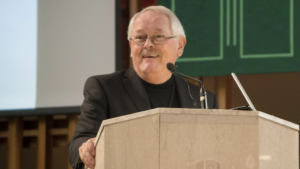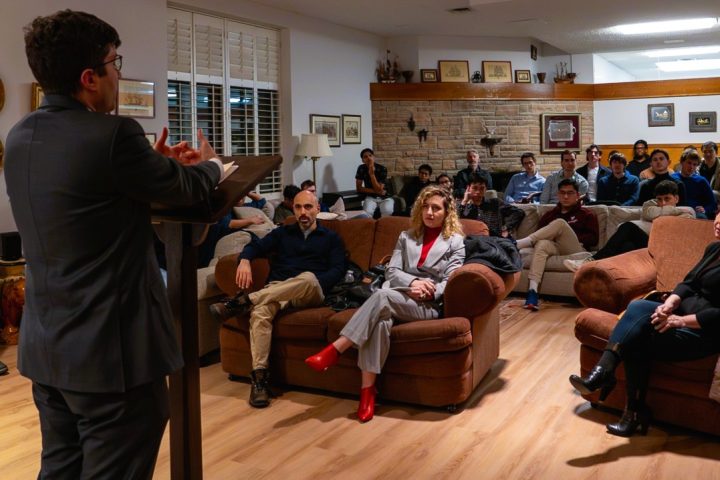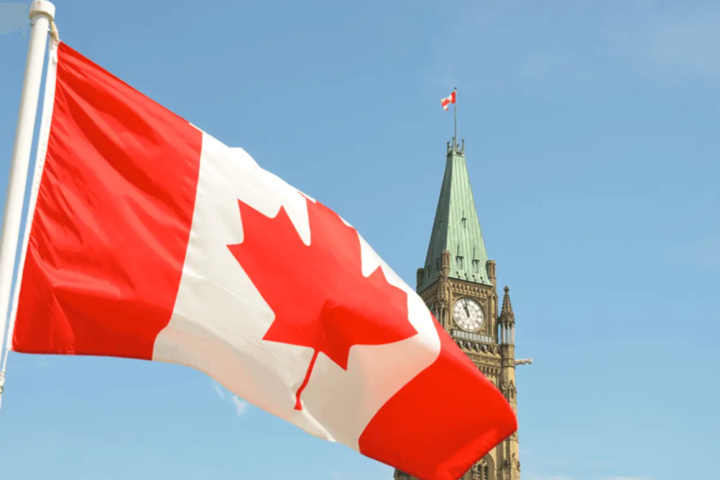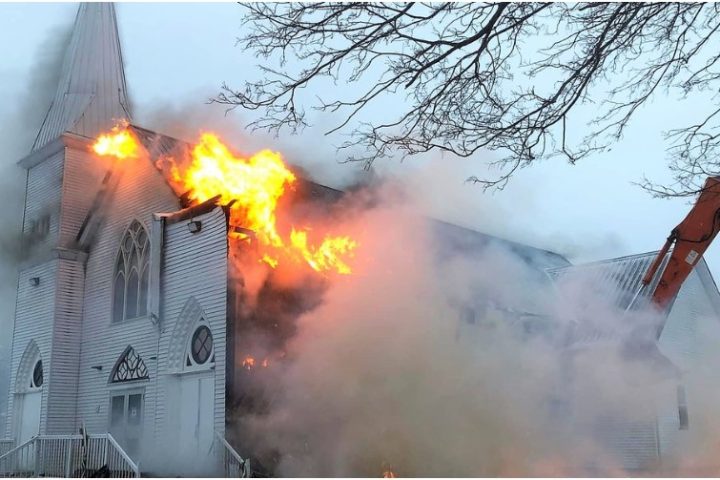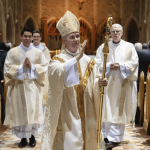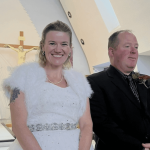By Jenny Connelly
Missionary zeal and closeness to the poor remain as the burning heart of the Oblates of Mary Immaculate, the order of priests and brothers who founded the Archdiocese of Edmonton and were essential to the evangelization of the Canadian West.
Recently, the Oblates of Mary Immaculate Lacombe Canada gathered in St. Albert for their national convocation, which had the theme of “Dare We Hope? Pilgrims of Hope in Communion.” Oblates and associates from across Canada – and the world – gathered to talk about how the Oblate mission to proclaim the Gospel and serve the poor will be actualized in the years ahead. As of 2024, the Oblates of Mary Immaculate have approximately 600 seminarians, globally.
We asked people who attended Convocation to put into their own words how the Oblates of Mary Immaculate are proclaiming the Gospel and serving the poor – both in the past, and the future. Click below for each of the featured interviews.
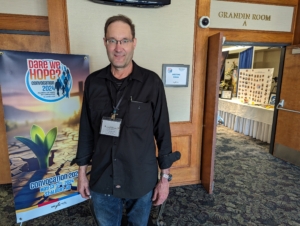
Father Marc Blom, OMI
Father Blom is a priest for the Archdiocese of Edmonton and the associate pastor for Sacred Heart Church of the First Peoples in Edmonton, the national parish for First Peoples in Canada
Why did you become an Oblate?
I started to feel this stirring of a vocation when I was 21-22 and I used to go to Mass at an Oblate house outside of the town of Battleford. And I went there because their Mass was earlier in the morning, and I had to be at work. The Oblates said “sure, you can come to our mass in the morning and then have a slice of toast with us.” So I did that.
I did not like these guys.
They felt like grumpy old men. And so I thought “I’m not joining these guys.” But then one of the Oblates gave me the “founders preface,” the opening chapters of the oblate rules and I read it and I was just caught on fire.
I remember thinking “Wow, I’m interested in this work, how can I join this? So that’s how I was caught by the charism of missionary work and serving the poor.”
Earlier in my life, I was struggling with the idea of priesthood and I went on a retreat. People in my parish had been saying, “Mark, you’re single, you go to church every day, why don’t you be a priest?” And I said “Oh no, I don’t want to be single.”
So I was wrestling with this, and I went on a retreat to a Benedictine monastery and I had good spiritual direction, but nothing was clicking. And I was having lunch in the cafeteria and there were some students there. I was just eating my lunch and listening to two guys at the next table, and one of them was just trash talking the Church. You know, he was running the Church down, saying that the Church is so behind, so confused.
I sort of said to myself, “yeah, you’re right, the Church is struggling. And then that night, when I was out for a walk, I said to God, “okay, I’ll do it. I’ll give it my best shot.”
And so what happened was my romantic streak was transferred from trying to find a lady to marry, to marrying the Church. So I sometimes tell young men that that longing for the intimacy and romance and relationship can be transferred to a romance for the Church. And so that’s what happened to me.
I gave my sacrificial gusto to be a missionary. I wanted to take the biggest treasures I could find and give them to the poor.
Father Ron Rolheiser, OMI
Father Rolheiser has been a priest with the Oblates of Mary Immaculate for over 50 years. He was ordained as a priest in 1972 and he served in the Archdiocese of Edmonton from 1972-1991. He currently resides in San Antonio, Texas at the Oblates School of Theology.
Is it accurate to say that the Oblates of Mary Immaculate founded the Archdiocese of Edmonton?
Yes, except I want to give you a different verb. The verb I like to use is that we “planted” the Church in this area.
And you know, it’s not just the diocese of Edmonton, but virtually every diocese in Western Canada west of Winnipeg was planted by the Oblates. There are some that we did not found but the major dioceses of Edmonton and Calgary, Vancouver, Saskatoon, Prince Albert. They were planted by the Oblates. Other priests came too, but the dioceses were largely planted by the Oblates.
And you know, the charism of the oblates is to plant churches and then we give them over to a diocese. So the whole idea is to spawn a diocesan clergy. That’s true in most other dioceses [that we have founded]. We plant a church, we get it going, and then it becomes a diocesan church.
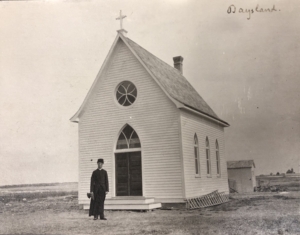
And in one regard we move on sadly – because it’s hard, emotionally – to move on. And so we leave churches (parishes) just when they’re really thriving and that’s what it means to be a missionary.
I’ll give you an example. The American Oblates, in the last 20 years, have let go of over a hundred thriving parishes, taken over by dioceses. And you know, in some ways it’s satisfying. It’s like, if you raise a child, the child leaves home, but it’s also emotionally hard on us. You know, you plant yourself there, you get embedded with the people and so on. And just when it’s really thriving and you move on. That is what has happened all across Canada, including in Edmonton.
But that’s also deeply Christian. Remember, Jesus said, everybody must leave something. Everybody who’s called by Jesus is asked to leave something. You leave something behind. And yet Christ promises that there is always new life after the sacrifice.
You’ve talked a lot about the missionary charism of the Oblates of Mary Immaculate and how founding dioceses and parishes has been essential to your work in history. What does your missionary charism look like now? Is your order still founding dioceses?
Excellent question. Both! First of all, we’re worldwide. So we’re still in a lot of places like Asia, India, and Vietnam. We’re still founding churches in Africa.
In the Western world, like North America, there aren’t new churches to be founded. But what we’re doing is we’re going to those places where most people don’t want to go. So you’re gonna find us in inner cities. You’re going to find us in parishes and places where others don’t want to go, to be with the poor.
If you go to places like London or Leeds or Dublin, If you go into the inner city where the cops are scared to go, that’s where you find the Oblates. We’re down on the borders in Mexico. So we try to find out where the poor hang out and then we try to move towards them.
As Jesus said, “the poor you’ll always have with you.”
What is a memory of yours that sums up what it means to be an Oblate of Mary Immaculate?
So one day I went to Edinburgh, Scotland. I went to our parish there and the whole area was barricaded. It was in a palace where the cops were scared to go. And I’m sitting there with the pastor, and we’re having a beer. He’s talked about how wonderful it is to be in this place and yet there are cameras for security and his rectory is like a fortress, for safety.
I remember he said “Well, the police are scared to come, but I feel pretty comfortable here.”
And I remember thinking “that is right.”
This is where we should be. Where no one else will go. With the poor. I was proud at that moment, proud to be an Oblate.
While I was still living in Edmonton, I went on a sabbatical to Oakland and we were in a rough part of the city and the pastor had built a bathroom that the homeless could use.
They could come at night, and they could sleep on the church grounds, and so on. And I had a car, and my car stood there for 6 months but it was never touched, because they knew I was a priest. That I was an Oblate. If anyone else had parked their car there, it would be gone in the morning, the tires would be gone.
And you know it was interesting, we’re in this really rough area of Oakland, and we’re probably the only 5 white people there, and I felt completely safe. The people on the streets, they knew we were for them. The pastor would go out at night, and he’d ask the guys to hand in their guns and one night he brought in 22 guns. He gave them back to them in the morning.
And I thought, “yah this is what it means to be an Oblate.”
You know, I also love working in urban, affluent parishes [where it’s more comfortable]. There can be more emotional satisfaction. But we’re called to be missionaries!
That is my invitation to young people.
I don’t say – do you want a “good” life? A comfortable life? I ask them do you want something hard? You want a real challenge? Join us! The adventure draws young people, and the Cross. But it’s a different kind of adventure. It’s the Adventure that Jesus assured us of, that we would also receive a hundredfold back.
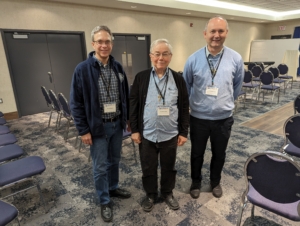
Fr. Ken Thorson, OMI
Father Thorson is the Provincial of OMI Lacombe Canada. Father Ken lived in Edmonton from 2011-2012, while he served as the Vocations Director for OMI Canada
How have the Oblates been essential to the existence of the Church in the Archdiocese of Edmonton and in Canada, overall?
What I would say is that the Oblates arrived in Canada at a time when there was a “westward push.” And European settlers were arriving, slowly moving west, and setting up little communities and the Oblates accompanied them. While this was happening we were also ministering to the Indigenous peoples of Canada. And so when we arrived [in Canada] back in 1841, our ministry was primarily with settler Canadians in East or central Canada. The Oblates worked with people in lumber camps, people working in the cities, with the poor and with Indigenous peoples.
And for the first 50 years or so of our ministry, many of our priests were working, in a sense, as itinerant ministers, moving with the people. We especially worked with Franco-Albertan people to help them set up communities; we were helping them to animate their spiritual life.
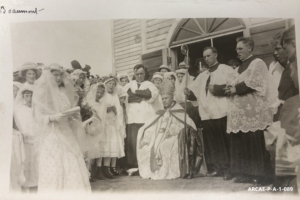
With Metis and First Nations we were working with them to develop a way of ministering to Indigenous people in the best ways that we could at the time. There were men like Father Albert Lacombe. Father Lacombe learned to speak the language of the First Nations people that he ministered to. Priests like him really made their home with the local peoples.
Then of course, in the late 1800s, we moved into the work of residential schools. And that was a time of discerning how we could work with the First Nations people to help them become educated, especially when their families and their communities wanted education for them. But of course, we set up a structure that wasn’t, in the end, respectful of their culture, of their languages.
So the history of the Oblates, in Western Canada, is both light and dark, and yet along the way we’ve learned much from our history, and we’ve learned much from Indigenous peoples.
Last night, we were learning from Chief Willie Littlechild about his experience at residential schools. How it was a difficult time, and yet it offered some good formation to him.
One thing that Chief Littlechild said that I found quite moving is that “you know we have our history and our history is both life-giving and challenging. But we need you, we continue to need the Oblates.”
Of course the Oblates went back to Maskwacis a few years ago in the person of Father Garry Laboucane. And so we continue to work as we’re able with the Indigenous peoples of the Archdiocese grateful to carry that ministry for the Archdiocese. And learning from the indigenous people as we go, it’s a ministry that we do with them. It is now a ministry where we learn as much from them as we teach.
As we move forward [as a religious order], one of our big focuses is to continue to work in Indigenous ministry, to work alongside Indigenous peoples. And the “hub” for our ministry to Indigenous peoples is here in the Archdiocese of Edmonton, at Maswachis, Enoch, Alexis, Lac Ste Anne and Sacred Heart Church.
A big part of why we are gathered here is to reflect on our commitment to these Indigenous ministries going forward. How can we ensure that we can sustain and continue to be present to First Nations ministry, even as our community has gotten smaller, and may continue to diminish. This is a vital ministry for us. It’s key to who we are today.
What is your hope for the future of the Oblate order in Canada?
My hope is that we work, where necessary, to revitalize our communities, because as religious, apostolic missionaries, the fundamental difference between our charism and that of diocesan priests would be our community life. So we want to work hard on making sure that we have vibrant, prayerful, joyful communities.
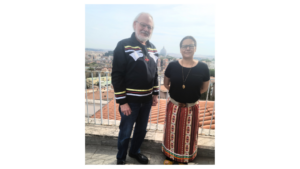
Lisa Raven
Lisa Raven is the executive director of Returning to Spirit, a healing ministry based out of Winnipeg, that works with the Oblates of Mary Immaculate, primarily through Fr. François Paradis, OMI, who serves as a trainer with Returning to Spirit.
Ms. Raven was part of the Canadian delegation that traveled to Rome alongside a small group of Canadian bishops, including Archbishop Richard Smith, prior to Pope Francis’ 2022 visit to Canada. Ms Raven is Ojibway, from Hollow Water First Nation in Manitoba. She attended Marieval Residential School in Cowessess, SK.
On the impact of the hospitality of the Oblates of Mary Immaculate during the Spring 2022 Rome delegation visit
We were invited during our time there to stay at the Oblate general house. And that was much appreciated! All of the costs were covered for our stay there. And, for me, that was one of the most meaningful moments of reconciliation for myself.
Because just imagine! You know, in my grandfather’s time, that never would have been possible, an Indigenous woman being invited to stay at the Oblate general house. So it was amazing that that happened, that I was welcomed and I was able to bring my bundle: my pipe and my drum and my rattle. At the meetings [in the Vatican], I was able to pray and do ceremony in ways that wouldn’t have been possible in the past. And not only that, there was a genuine curiosity about [my people’s ways]. I expected maybe 5 or 10 people to be interested, when I was sharing in the Vatican about different Indigenous traditions, but then over 50 people came, seminarians came, all there to learn.
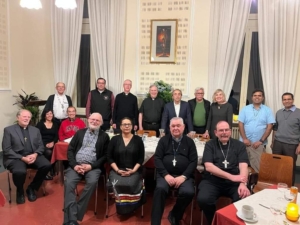
So that experience in Rome was a real acknowledgement for me of how far we’ve come in terms of reconciliation. Sometimes that is hard to measure, how far we have actually come, but for me this was a very, very clear example of what we’ve been able to achieve!
There were many missionary Oblates who ran residential schools, including the one that I attended, so developing this [new] relationship with the Oblates in the present is healing. I don’t think these kinds of healing experiences get highlighted too often and they really should!
Because this is the essence of reconciliation; it’s not a list of boxes to check off. No, it’s about these moments – like what I experienced in Rome – and we need to collect as many of these moments in our lifetime as we can!
Fr. Antoni Bochm, OMI
Fr. Bochm is the international Vicar General for the Oblates of Mary Immaculate. Fr. Bochm is from Poland and he has been a priest with the Oblates of Mary Immaculate for 25 years (ordained in 1999).
One of the charisms of the Oblates of Mary Immaculate is to be missionaries and yet we live in an age where there is not much literally uncharted territory in the world, so to be a missionary looks different than it did in the past. How does the missionary charism of the Oblates look different now?
Pope Francis has said every land is a mission land and so anywhere where the Gospel is not present, that is mission territory. There are not many places where there is uncharted territory, but we see that in many parts of the world, Christianity is still absent. So we [must be] present there and so there are Oblates all across the world. But we are there to bring hope and to give birth to new faith, so that people will be open to being Christian.
I also understand that an essential charism of the Oblates of Mary Immaculate is to minister to the poor. What does that mean?
Yes there are those who are poor, who are living without nothing – and we are serving them. But there are also those who are spiritually poor: those who are far from hope, in despair. So we address our message to all kinds of poor, both materially and spiritually poor. When you look at Oblates [across the world], many of our parishes are on the peripheries, where the poor are. So we really try to be among them.
I am originally from Poland and there we have a group of lay people founded by an Oblate. Their mission is to take care of people who are trying to get away from drug addiction. Many of the people who lead this ministry were once addicted to drugs and now they go out and share how they became free, to help other people. I remember [this group would go], for example, to a train station where there are many addicts and they would invite people to come to meetings, where they could begin the process of becoming free from addiction. And I would go with this group; as Oblates we always try to be close to those who are poor, those who are suffering.
What would you say to a young man who is the discerning priesthood, and he’s looking at the Oblates? What is unique about the Oblates?
Oh, I think it is community life! Now, that attracts many young people. And I think many of us who are already in the congregation, the community life, where we work together, pray together and do the mission together. That is for me, and many others, [one of] the most important elements.
What would you say to a young man who feels called to be a missionary?
I would repeat what Chief Littlechild said:
“The Church still needs us!” There is a lot to do now, you will never be without work, if you become a missionary. People are waiting for us in many, many parts of the world. There is a need for many young people!
We have many vocations in our congregation, but in other parts of the world; not so much in Canada. In the past, the West sent missionaries to the global South, but now it is for the South to send missionaries here, where there is much work to do!
We must pray for vocations, we must work for vocations!


